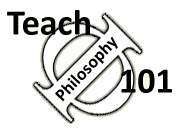Teach Philosophy 101
Free resources for
philosophy teachers!
"One of the most comprehensive, well-researched, and accessible guides for teachers that I have ever seen." James Lang, Chronicle of Higher Education (read full review of TΦ101)
Assessments
Your Dean and your Provost are hearing a lot about assessments from the accrediting agencies and from everyone else, and sooner or later you'll hear about it too. We say that our goal is educating students, and -- in today's consumer-driven world -- the people who pay our salaries want to know if they are getting their money's worth.
TΦ101 completely believes that the discussion of assessments has tended to conflate two completely different concerns. On the one hand, TΦ101 entirely agrees that in planning our courses we should have clear learning objectives for our students and some way of determining whether those objectives have been met. Instead of asking, "What do I want to teach?" we should ask, "What changes do I want to foster in my students, what will I have to do to create those changes, and how will I know if those changes have occurred?"
All of this is quite different, however, from meeting the demand that we be able to quantify these outcomes, especially if this means that we need some sort of standardized testing. As TΦ101 develops we hope to be able to provide some more thoughts on this topic, and please send us your reflections. Here are a few resources:
-
American Philosophical Association's "Statement on Outcomes Assessment," has some useful information and also links to universities that have been working in this area.
-
The Collegiate Learning Assessment is an instrument developed by the RAND corporation and the Council for Aid to Education, that provides an intensive survey of the development of analytic thinking stills.
-
The National Survey of Student Engagement (NSSE) is providing a different approach to accountability in higher education by measuring student participation effective teaching and learning activities. Many of the activities that NSSE measures are just the kind of thing that should happen in an intro philosophy class. Students are asked, for example, how often their course work emphasizes applying theories or concepts, or how often participate in class discussions. Full disclosure requires us to mention that until January 2010, John Immerwahr (founder of TΦ101) is a member of NSSE's National Advisory Board.
-
"What Counts as Assessment in the 21st Century," by Ken Buckman, a Philosophy Professor at the University of Texas-Pan American in Thought and Action: the NEA Higher Education Journal, Fall 2007, 29-37, 25 January 2008.
-
Michael Strawser has an interesting discussion of assessment in the context of hermeneutics and continental philosophy in "Assessing Assessment: Toward a Hermeneutic-Phenomenological Perspective," in Insight 4 (2009).
Author: John Immerwahr
Update: 15 Dec. 2015 (E. Tarver)
